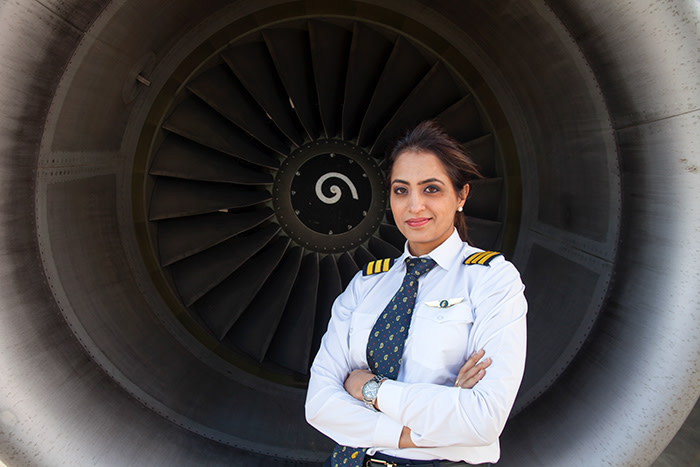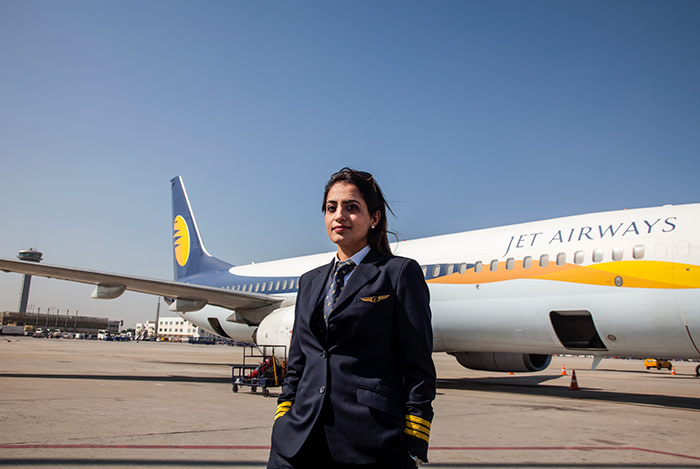Aerospace MBA accelerates career take off

Simply sign up to the Business education myFT Digest -- delivered directly to your inbox.
Divya Manchanda is determined to go far in aviation. The former IT engineer travelled from Bangalore to Florida to attend pilot school in 2008. Then she battled for four years, working multiple jobs to repay student debts and land a job as a turbo-prop pilot with Jet Airways, India’s second largest airline.
But success as a pilot in a highly competitive, male-dominated industry was not enough. In 2014 she read about the planned launch of an Aerospace MBA by the Indian Institute of Management in Bangalore, in partnership with Toulouse Business School in south-west France.
“I strongly believe that you should not stop learning,” Manchanda says. “When you have a technical expertise, be it as a pilot or engineer, you tend to get very tunnelled in your approach to life. You see things in one direction. The initial reason for me to do the MBA was for my own personal growth.”
Admitted to the first Bangalore cohort of the new joint programme in April 2015, she studied for a year in India before completing the MBA part of the two-year programme in Toulouse in September 2017.
It was to be a transformative experience. “If you met me two years ago and again now you will see the change in me,” she says. “I used to be intimidated by a lot of people. That stopped. I became more competent. The upside, in terms of personal development, was huge . . . it was amazing.”
Her remarks echo those of Professor Christophe Bénaroya, director of the Aerospace MBA in Toulouse, on its approach to student selection.

“I look for people who are passionate about the aerospace industry, people who want to identify and overcome their weaknesses,” he says. “[Just having] an MBA is no longer a passport to a job.”
A sharpened focus on personal development is among several factors underpinning a redesign of the Aerospace MBA programmes under Prof Bénaroya, a former consultant and business-to-business marketing specialist who took charge in 2015.
The Aerospace MBA programme in Toulouse, the hub city of Europe’s aerospace industry, was launched in 1999 at the instigation of European plane-maker Airbus, a group of its suppliers and France’s Centre National d’Etudes Spatiales (CNES). The aim was to help their managers, typically from an engineering background, acquire the financial, strategic and “soft” skills that become increasingly important as they climb the management hierarchy.
But the process of gaining accreditation from the Association of MBAs (AMBA), combined with participant feedback, has led to a rethink of the course. “Education requires humility,” says Prof Bénaroya. “When we look at the people who apply, they come to acquire the soft skills that will enable them to work efficiently in the new, increasingly digital, world of work. First, the ability to work in a truly international environment: with someone from Zambia, from Kazakhstan . . . from everywhere.
“Second, they come to Toulouse to have contact with the industry. Toulouse is home to three aircraft manufacturers, a quarter of the space jobs in Europe — it’s a unique opportunity. It’s also about learning to fix issues in a different way. If you go to live and work abroad, you have to leave behind all of your preconceptions.”
Participants joining the redesigned MBA enrol on one of three integrated Aerospace programmes. One group takes the one-year, full-time Aerospace MBA; typically aged 32-42, about half will be newcomers to aerospace and half professionals in the industry. All will have a degree, a good grasp of English and at least three years’ work experience. Tuition fees are currently €30,000, and participants will need to fund living expenses in Toulouse, plus air fares to seminars in Montreal, Canada, Seattle in the US and Casablanca in Morocco.
A second group takes the 18-month part-time programme, costing €35,000. Typically aged 35 to 50, they are working as pilots, in-flight management, operations and other corporate roles. The third group will comprise second-year MBA students from the Bangalore programme, with industry backgrounds embracing airlines, defence manufacturing and the military.
The aim is to bring these diverse groups together for lectures by faculty and industry speakers and to work on projects where their varied experiences and approaches can lead to cross-fertilisation of ideas. Participants on the full-time programme will complete their course with internships in companies such as Airbus; others will develop projects within their workplaces.
Karen Fernandes, an Australian IT industry and project management professional who was on the 2017-18 full-time MBA, completed her course with project work at Airbus. “My dream job is to work in maintenance, repair and overhaul,” she says. “It will enable me to apply my IT and project management skills on aeroplanes. I have been fascinated by aeroplanes since I was a child.”
Manekshaw Parasram, a full-time student from New Zealand, says joint coursework with part-time participants working in the industry was one of the highlights. Others were learning to work closely with people from different countries and cultures and developing a project within Airbus in partnership with Palantir Technologies, a Palo Alto big data specialist, to explore ways of using data supplied by aircraft operators.
Another student says the breadth of the course and diversity of backgrounds occasionally led to a lack of depth for some on topics that others knew well, but participants’ concerns were heard and addressed.
After graduation Manchanda transferred to communications at Jet Airways, and then to a department responsible for strategy and business transformation. Recently she took a break from that to learn to fly the Airbus A330 long-haul jet. True to her belief that you should “never stop learning”, she plans to study new programming languages, machine learning, artificial intelligence and data science.
Having returned to flying, Manchanda hopes to resume her management career later and one day wants to “start something of my own”. But, she insists: “The career development is just the cherry on the cake. The Aerospace MBA is really about personal development.”
Comments